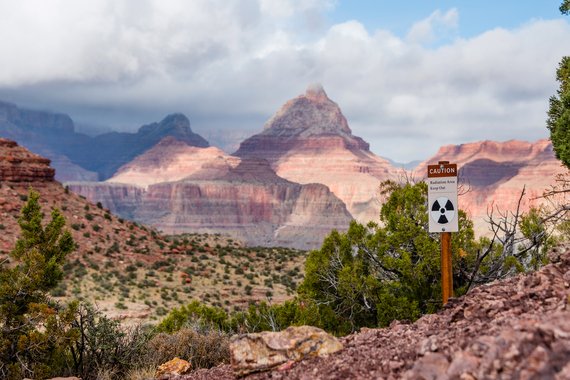Damage from Mining within the Grand Canyon.
Courtesy: Blake McCord
As summer approaches and American families plan vacations, one of the top spots for travel consideration is the majestic Grand Canyon.
President Teddy Roosevelt, considered the "conservationist" president, declared the Grand Canyon a monument in 1908. It was made a national park in 1919 by the National Park Service, which was established in 1916.
Roosevelt had a clear understanding of the importance of preserving America's resources--and the actions of those who would despoil them for monetary gain. He signed the Antiquities Act of 1906. The goal was to create a tool that would allow future presidents to protect the country's historical and natural sites.
Now, calls are out to President Obama to make the "greater" Grand Canyon a national monument. This would encompass approximately 1.7 million acres of public lands surrounding the park.
Why? It is a response to potential encroachment on the gateway to the Grand Canyon.
Unsurprisingly, the issue at hand involves revenue, big power brokers, ramifications of Citizens United, and a familiar actor in the anti-environmental space--the Koch Brothers.
The debate is about mining, which has been a source of contention for over a century, when land claims were first staked. Older mines that were "validated" went forth. One of those, Canyon Mine, is located six miles south of the Grand Canyon.
Many of the original owners of mining claims shifted their land over to tourist properties. However, there are approximately 3,000 "unvalidated" claims currently on hold under a temporary 20-year ban issued by the Secretary of the Interior in 2012. The impetus was to protect lands from "imminent threat."
Now, with Obama leaving office, the struggle to get permanent protection has intensified.
Environmentalists and Indigenous groups (The lands of the Havasupai Tribe lands border the Grand Canyon. They are specifically concerned about water radiation and contamination.) are pitted against various politicians, the National Mining Association, and the Arizona Chamber of Commerce Foundation. The latter all have ties to Koch Brothers funding.
As a precursor of what could possibly be in store, it must be noted that there was a superfund site on the southern rim of the Grand Canyon.
Mining not only scars the earth, it disturbs the ecosystem of the canyon. It threatens the tourism industry ($700 million), releases toxic chemicals into the air (uranium dust can cause lung cancer), and puts water supplies in danger.
Those who are against a permanent ban on uranium mining at the Grand Canyon gateway make up an unsavory stew. At the state level, the same players who support suing the EPA over the Clean Power Plan, are part of the mix. The groups supporting uranium mining--and against giving the Grand Canyon and its environs full protection--use the Kochian Newspeak of "limited government" and "federal overreach."
Greg Zimmerman, Policy Director at the Center for Western Priorities, co-authored an article with a very succinct drill down on the money trail.
I asked Zimmerman for his thoughts. He wrote via e-mail:
"These efforts are being driven by wealthy, ultra-conservative industrialists who are committed to rolling back over a century of land protections across the American West, including at the Grand Canyon. Mining at the gateway of the Grand Canyon remains incredibly unpopular among Arizonans and Americans alike, but it's not stopping these individuals from undermining our outdoor legacy."
A poll of Arizona residents who expect to vote in November 2016 confirmed Zimmerman's assertion of support for monument status. The numbers showed that statewide, 80 percent favored the establishment of the Greater Grand Canyon National Heritage Monument. When asked if a candidate's stance on the issue would impact their choice, they answered in the affirmative by a "three times as likely" ratio.
David Metz, who worked on the project told me:
"Data doesn't get much clearer than this. Survey after survey shows overwhelming support among Arizona voters for a national monument near the Grand Canyon. Arizonans understand it, want it, and they are ready to back members of Congress who will work to make it a reality."
Rep. Raúl Grijalva, of Arizona's 3rd District, has been on the case since 2008. In November 2015, Grijalva introduced the Greater Grand Canyon Heritage National Monument Act (H.R.3882). It is currently languishing in the Subcommittee on Federal Lands.
Program Director of the Grand Canyon Trust, Roger Clark, speaks with passion about how the Grand Canyon's future hangs in the balance. On the phone he underscored the point, "The Grand Canyon has always been sought after for monetary gain. Yet, it's inconceivable that profiteers would spend so much money to undermine one of our nation's greatest treasures."
The conversation ended with Clark's observation, "Citizens everywhere must rally! The barbarians are at the gate."
As the Koch Brothers undermine protections at the Grand Canyon, let's remember what our children are at risk of losing.
"The Grand Canyon fills me with awe. It is beyond comparison...Let this great wonder of nature remain as it now is...You cannot improve on it. But what you can do is to keep it for your children, your children's children, and all who come after you, as the one great sight which every American should see." ~ President Theodore Roosevelt's
This story originally appeared on the website Moms Clean Air Force

